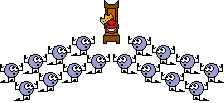Audley Strange wrote:Rum wrote:There's a similar proposition I read about a while back - the Omega something or other which suggests that given the ever and exponential increase in computer power the universe will one day digitise itself and the Big Bang or something like it is actually the 'simulation' booting up.
Slightly more plausible than a God in my book. Slightly.
]Is it the extrapolation of this?
http://en.wikipedia.org/wiki/Kardashev_scale
GrahamH wrote:
A simulated taste, in a simulated universe, is not a sensation observed/experienced from outside the simulation. A Bostrom scenario is a super-SIMS where the sims interpret the SIM world in terms of tastes, objects, being able to see X but not Y, recognising an avatar as 'me', etc.
Simulated characters can certainly behave according to what they can 'see', or what objects they 'touch'.
It is an error to think of yourself, outside a simulation, looking at the simulation as a 'presentation'. You have to think about it on the inside of the simulation. The sim-ball falls due to sim-gravity untill it hits the sim-ground. These simulated objects have no access to the simulator or the 'real world' in which the simulator exists.
We should also consider that simulations within simulations tell us little about what is possible in the real of the top-level simulator. The Super-SIMS don't get to work out the limits of how our world works by making their own simulated world, although there are likely to be resemblances. If we are Super-SIMS we can't reach out to reality beyond the simulation unless the simulator provides the means to do so.
I don't think Bostrom's numbers game is too convincing, but I don't think we can entirely dismiss the notion based on what we have simulated to date.
If we are Super-SIMS does it matter? What difference would it make to your life if you believed you were a Super-SIMM?
I think you may have missed my point. What I was getting at is that we have to consider that if we are in a simulated then all information that we perceive and translate into sense has to be identified and coded into the engine.
That doesn't follow. It is not unreasonable to suppose that everything that occurs in the simulation is a consequence of how the simulator was built, but how the simulation turns out could be well beyond the expectations of the designers. What human design entirely anticipates all outcomes of the realised design? I suggest that never happens.
We can also consider that the simulator is not entirely self-contained. Something as simple as physical random number generator can drastically affect the outcome of a simulation due to small influences from the real world.
Audley Strange wrote:Since we have no evidence that this is even remotely possible for us to achieve (bearing in mind that the programmers programmed us to be sensate, and to build computers and our own "simulators") to extrapolate that it is not only possible for meta-civilisation to have done so, but that we are very likely to be the outcome of that, is a long stretch.
Why not assume 'the programmers' designed a system of physics that could generate complexity and left it to do its thing? Bostrom assumes people like us investigating their own evolution through simulation, but that basic concept could apply to any stage of the universe. It is stongly anthropocentric to presume it is all about us as conscious human beings.
Audley Strange wrote:I am also curious to why such programmers would code us to conceive that we are in a simulation. As I said, I can't dismiss it outright, but I find it highly unlikely that he is correct.
Bostrom's 'Programmers' would have set things up to have people like them, in a world like theirs, operating on cognitive processes derived from theirs. That passes a lot of information about the real world into the simulation. Why should that not produce fractal echoes of reality within the simulation?
As I said, I don't think it is possible to put probabilities on such an idea.
Audley Strange wrote:As for what difference it would make? Ask suicide bombers. Ask psychopaths. It's very easy to use such a nebulous theory to excuse yourself of personal responsibility if you can claim God made you that way, or some Meta-entities programmed you that way. It is potentially very dangerous to believe you are not real.
'Not real' is pretty meaningless. If we exist as patterns of energy in a 'real' computer running a simulation, and as such we have thoughts and find 'meaning' in our world, then we do exist. You might prefer to say we a patterns of energy in the form of flesh bodies. Some prefer to think that, in essence, they are patterns of spirit maintained by a divine being. Are any of these non-existence or unreal in a sense that should make us stop valuing our collective existence? Why?
 or just pulls out the plu...
or just pulls out the plu... 


